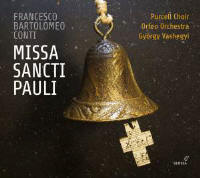Reviewer: David
Reznick
“My object all sublime / I
shall achieve in time / to make the punishment fit the crime….” (The
Mikado)
I am easily pleased, easily
amused, and try my best to be kind. This makes me a happy person. And
there’s nothing that makes me happier than to receive a review copy of music
by a composer like Francesco Bartolomeo Conti, a composer I’ve never heard
of, but whose dates, 1681–1732, fall squarely into the period which
interests me most. Yes, I missed him, but his more storied contemporaries
did not: both Handel and Bach “rescued” a few bits of Conti to use in their
own work. Nor did my ignorance seem to bother him—during the 51 years
allotted to him, he completed 25 operas (!), many of which still exist in
scores (!!), several oratorios, and the usual pile of various religious
music. Sounds as if he’s slated for a modern-day review to see what we have
here. But the fact that it’s not happening is hard to figure out. This disc
contains pro-Conti and anti-Conti evidence.
The Missa Sancti Pauli is a salvage job typical of the era. A
performing edition was cobbled together from a number of unsatisfactory
sources, and a trio sonata and motet were thrown in, another standard
operation. Vashegyi and his musicians make a good case for what is left
(although I’d say the choir, at 24 voices, is a bit top-heavy for this
music). The music overall is mostly pleasant, almost entirely in the minor
mode, and pretty much unmemorable. The exception occurs in track 9 (the
qui tollis). After the first 8, during which the music behaves itself
and gives no offense, there is a sudden use of dissonance and faux
cadences, reminiscent of Purcell. This goes on long enough to wonder about
all those operas moldering in the attic, and what they might sound like.
Middle-Baroque completists will want to acquire this one.
Whew! Now I’ve given you an idea of the music, so I feel I can
finally move on to what I really want to tell you, which in the immortal
words of Anna Russell, I am not making up. The following information (with
some interspersed notes by me) comes from Johann Matheson, whom you remember
as Handel’s pal (except for a few brief minutes when he almost killed Handel
in a swordfight). Matheson was in receipt of a letter which described an
episode in Conti’s career that might possibly have been better handled:
“On September 10 in Vienna the Imperial Composilore di Musica,
Francesco Conti, was expelled from St. Stephan’s Cathedral by virtue of an
excommunication pronounced on him by the local Consistorio. His Imperial
Majesty had reduced the imposed standing from thrice to once out of innate
kindness; but since then the man behaved very badly the first time, in the
view of many hundreds of persons, as he did the second time on September 17
when placed before the doors of said church for an hour in a long hairy
coat, called a coat of penance [Note: Conti was a renowned mandolin player,
so the mental picture of him strumming away in the fur coat seems to have
anticipated the mandolin-fur coat fad of the 1920s], between twelve guards
who formed a circle around him while he held a burning black candle in his
hand; the same thing is also to occur on the 24th. His food is bread and
water as long as he remains under the ecclesiastical authority; after
transfer to the secular he is to pay the priest who was beaten by him 1,000
guilders in compensation as well as expenses [Note: This hardly seems fair.
The priest was probably asking for it], then remain in jail for four years
and subsequently be banned from Austria forever: since as he stood in front
of the church doors the first time he used a very uncivil and vexatious
effrontery (i.e., he used his art of gesticulation in a most wicked manner).
The said court-Compositeur has been sentenced to such punishment because he
laid violent hands on a priest and beat him up severely.
“The following epigram has been made about him: ‘It is not good
Muse, nor Music, which you have composed Conti, for that was a heavy touch:
And the bass is too heavy, and the key is not harmonious: Hence as a result
you bear black marks forever.’” [Note: apparently the name of the
silver-tongued wit who wrote this epigram has been lost to history; however,
I understand that his great-great-great-great grandson is in charge of
writing Trump tweets.]
So, if I
understand correctly, this unfortunate fellow was ruined and run out of town
for the grave offense of flipping the bird in front of the church that had
previously nourished him; and he did this centuries before the invention of
the automobile and the freeway. This alone should qualify him for a second
chance at CD stardom. Or if nothing else, a biopic should be made. I’m
thinking Gilbert Gottfried for the role of Conti.
Fermer la fenêtre/Close window |




